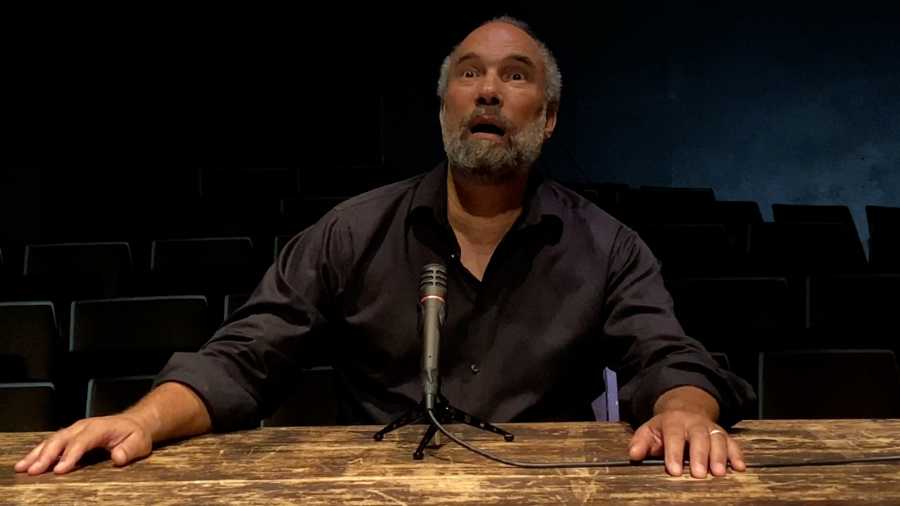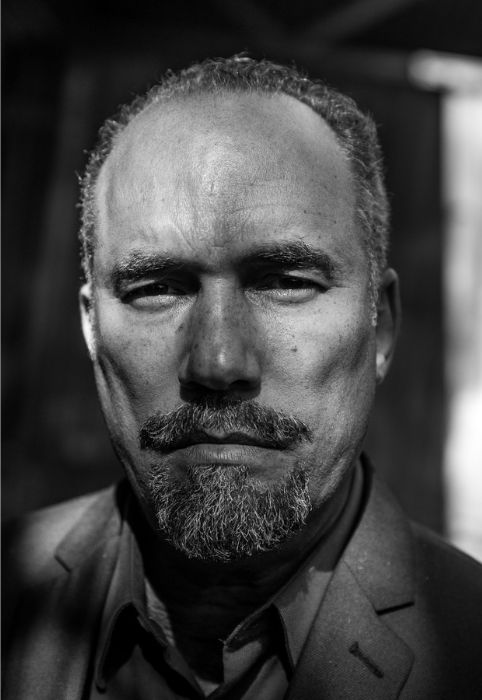There is a really solid chance you’ve seen Roger Guenveur Smith in a film, especially a Spike Lee joint.
For more than three decades, Guenveur Smith has taken on a dizzying array of roles, whether as a fraternity pledge in “School Daze,” a stuttering photo vendor in “Do the Right Thing,” or a smooth, red convertible driving hustler in “He Got Game.”
And that’s just his suite of movies with Lee. If you’ve watched cult classics like “American Gangster,” “King of New York,” “All About The Benjamins,” “Eve’s Bayou,” “Hamlet,” “Deep Cover” and “Self Made: Inspired by the Life of Madam C.J. Walker,” you were fortunate enough to have witnessed the unparalleled range of this actor’s actor.
More recently, Guenveur Smith has merged his passions for theater and history by playing revered and not-so-revered historical figures in staged one-person shows, adding depth, dimension and light to their legacies.
From Oct. 5-7 at the Virginia Wadsworth Wirtz Center for Performing and Media Arts in Chicago, Guenveur Smith is illuminating the life of one of those figures in “Otto Frank,” about the father of Anne Frank, author of the eventual “The Diary of a Young Girl,” the most widely read non-fiction book in history outside of the Bible.
Guenveur Smith spoke with The Chicago Defender about playing Otto Frank and the other historical portrayals he has brought to the stage and screen, like Black Panther Party co-founder Huey P. Newton and Christopher Columbus.
He touched on why Otto Frank’s story still resonates today, especially in light of the government-sanctioned persecution that his family endured. We also get into how he got the idea for this acclaimed show, which — spoiler alert — occurred when he walked into a room of a house in Amsterdam.
Chicago Defender: What did you learn about “Otto Frank” while making this production?
Roger Guenveur Smith: Well, you have to come see the play. You’ll find out (laughs).
I learned a lot, and I didn’t. I didn’t know a lot when I started this project. In fact, I was kind of brought to Otto Frank by Rodney King because I was doing a play on Mr. King, a solo performance. I was invited to Amsterdam to do that show. And it was in Amsterdam, that I got to go to what’s called the “Anne Frank House,” which is where [his family] hid for almost two years, and I was quite moved.
It was a really interesting way of diving into this work imaginatively. To stand in a very small room and imagine this man coming back from a near-death experience. In fact, [Otto Frank] was in front of the firing squad in Auschwitz. He came out and found that he had lost his wife. He made his way all the way through Europe, on his way to Amsterdam, in hopes that his daughters would be found. They were not. It was determined that they had perished.
One can only imagine what that feeling was for him to be in that place. And then to be presented with this diary that his daughter had devised before they were pulled out of Amsterdam by the Gestapo.
And this was a gift that he had given to her on her 13th birthday, which was spent in hiding. And he would take her diary every night and lock it up in his briefcase. He never betrayed her trust. He never read it. But then to be handed the diary, which was held by a comrade there in Amsterdam, and to see that it had been filled, more than filled up, with extra notes Anne stuck in it. It took him months, apparently, to even make his way through the diary.
Then, to make those crucial decisions about it: What are you going to do with it? Are you going to destroy it? Are you going to share it with other survivors? Are you going to publish it and get it out there in the world at large? He made the third choice because he determined that that’s what his daughter wanted. She wanted the largest exposure possible.
So, anyway, that’s how the work began. It was just a matter of determining how exactly to go about staging this. Because I have done a number of solo performances inspired by historical characters, each way of doing it has been different. How am I going to dive into this one is the question.

Chicago Defender: Can you take me into your mind regarding how you prepare to play a central character in a one-man show? What does that process look like for you?
Roger Guenveur Smith: Well, as I said, I have to figure out a way of doing it. Huey, for example — which the folks in Chicago may have seen, I did it at the [Museum of Contemporary Art] there — it was almost completely improvised. Otto Frank is a written piece. I actually sat down and wrote the piece. So they’re very different in that way in terms of form.
Although there are some video clips of Otto Frank speaking, and certainly there are video clips of Huey speaking, I didn’t, with either character, sit down and try to approximate who they were in a physical sense. It was more important to dig into the interior of these men than to try to approximate the outside.
[perfectpullquote align=”left” bordertop=”false” cite=”” link=”” color=”” class=”” size=””]”…that was the first thing which drew me to the story of Otto Frank, walking into that empty room that had been filled with his family and to be there alone.” – Roger Guenveur Smith[/perfectpullquote]
Chicago Defender: As an artist, how gratifying is it to do a theater production, a one-man show? What do you get out of it artistically versus playing a role in a movie?
Roger Guenveur Smith: Well, there’s a live audience. That’s a big difference. A theatrical performance is not simply the action, in this case, a solo person on stage. We’re all in that theater, breathing the same air, for better or worse.
It’s a collective activity, and we contribute to the emotional journey in that hour, hour and a half, that we’re in that room. Though film is a different medium, the instrument of the camera goes underneath the skin. And I think that it’s probably reality minus 10% that serves the camera.
On stage, it’s reality plus 10% that serves that experience because you have to hit that last row, vocally and emotionally as well. So, that’s what I tell my students: plus 10, minus 10.
Chicago Defender: Which medium do you prefer?
Roger Guenveur Smith: I can’t imagine a year going by without doing both of them, which makes the situation that we’re in right now very difficult because there are so few opportunities as a union actor to work in front of the camera (sighs). But it’s certainly not the same as being able to do what I have been able to do for the last three decades now of work.
Chicago Defender: That’s awesome. That is a blessing.
Roger Guenveur Smith: It’s a blessing to be in Chicago. Of all the major cities in our country, I probably have worked in Chicago the least and have visited the least. So I’m always happy to get back and learn more and more about your fair city. And I’m really honored to be interviewed by the Chicago Defender, such an important institution in our history.
Chicago Defender: Thank you.
Roger Guenveur Smith: Thank you. You know, the last feature film I did, “Till,” took place in large measure in Mississippi. But of course, it was informed by what was going on in Chicago at that time. I was certainly happy to be part of that production.
Chicago Defender: Indeed. So, what can audiences expect from “Otto Frank” when they see it?
Roger Guenveur Smith: Well, I don’t want folks walking out of the theater and saying, ‘Well, wasn’t it horrible what happened way back then.’ I think that the degradation of that moment tragically reverberates in our own moment. Otto Frank lived a long and fruitful life. He was 91 when he passed. He made it into the 1980s. So, there are those who were connected to his generation who are certainly still among us. And even if they are not still among us, the horror and the terror of the Holocaust continue to tragically inform our current moment.
Not simply in the sense of what was going on in Western Europe at that time, but in the sense of what continues to go on all over the world in our cities in Chicago, in LA and New York. Jacksonville, Florida.

Chicago Defender: Definitely.
Roger Guenveur Smith: We had a recent president, who will go unnamed, who went to our border with Mexico and saw a barbed wire fence being installed and remarked to the crowd that, ‘there’s nothing more beautiful than barbed wire when used properly.’ So, there you have it.
Chicago Defender: Wow. Yeah.
Roger Guenveur Smith: “Otto Frank” is in a long line of characters that I’ve taken on who have commented on America or have made their mark in America. From Huey to Frederick Douglass to Dr. T. R. M. Howard, featured in the “Till” film. Walter White, who was the secretary of the NAACP. Christopher Columbus. We all think we know who [Columbus] was, but I give you another version in my stage play. So, I continue to be inspired by history, biography. I found it to be very rewarding to put those interests together with my interest in performance.
I offer them to be able to contribute to the long and necessary line of conversation and action that The Chicago Defender so beautifully committed itself to.
Chicago Defender: Indeed. For people who read The Defender, especially Black people, what would they get out of watching a production like “Otto Frank,” in your opinion?
Roger Guenveur Smith: Well, I think that “Otto Frank” certainly represents more than just a German, Jewish, Dutch advocate. He was essentially a father of two daughters, as am I. And I think emotionally, that was the first thing that drew me to the story of Otto Frank, walking into that empty room that had been filled with his family and being there alone.
That’s something that, unfortunately, tragically, we continue to negotiate the sense of loss. We recently recognized the loss of those four little girls in “Bombingham.”
Their murder is no more or less devastating than the murders of the Frank sisters. Their murders were undertaken by government sanction. There’s an entire armed movement that deprived them of their adulthood. I think the same can be said for the tragedies of our nation.
This interview has been edited and condensed for clarity.
For More Information
What: “Otto Frank,” starring Roger Guenveur Smith
Where: Wirtz Theater (Room 203): Virginia Wadsworth Wirtz Center for Performing and Media Arts (710 N. Dusable Lake Shore Drive)
When: Oct. 5-7, 2023 (Shows: Thursday, 10/5 7:30 p.m.; Friday, 10/6 7:30 p.m. and Saturday, 10/7 2 p.m. & 7:30 p.m.)
For Ticket Information: Visit wirtz.northwestern.edu/otto-frank
